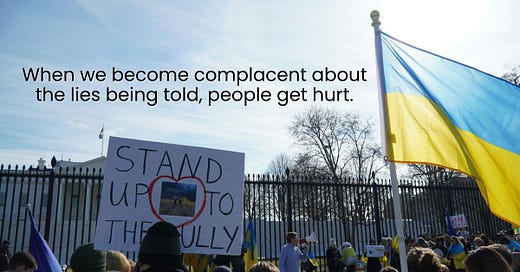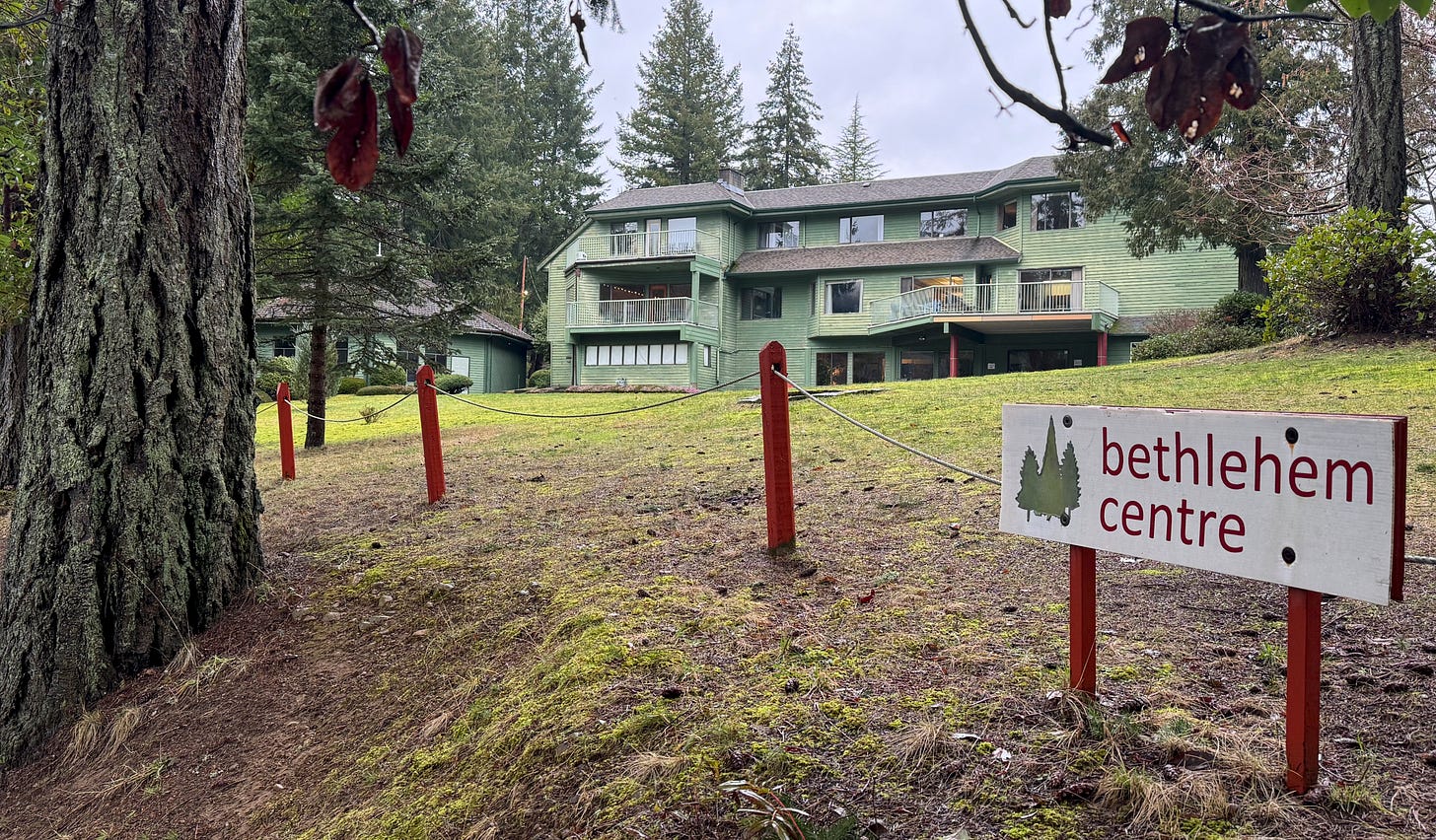It matters how we tell the stories (and other thoughts on resisting tyranny)
Plus a gift for those committed to the resistance
“When I despair, I remember that all through history the ways of truth and love have always won. There have been tyrants and murderers, and for a time, they can seem invincible, but in the end, they always fall. Think of it--always.” ― Mahatma Gandhi
Before the article about truth-telling and tyranny, a few announcements…
This week is the second webinar of Leadership for Liminal Spaces. On Thursday, February 27, we’ll be introducing the concept of a Grounded Guide and talking about the core competencies needed, especially during these liminal times. Join us for the webinar, and then keep coming back for the study group to go even deeper. (Note: to learn about free program registration, read the post below.)
We are getting excited about our Alumni Gathering in September. I went to visit the site of the gathering (here on Vancouver Island) and it feels like the perfect place to gather - a comfortable, well-tended space that has access to big trees, a lake, and other wild and beautiful spaces. If you haven’t registered yet, please do so by March 16th as we need to confirm the space.
Although I decided to postpone my teaching trip to Belgium, I am delighted to be partnering with my friends at HUMMUS to deliver an online workshop on Holding Space and Deep Democracy in times of uncertainty and disruption which takes place on April 22 & 23.
This week’s fun discovery was that I’ve been referenced on Wikipedia as the person who popularized the term holding space.
It matters how we tell the stories
Listen to me read the post…
A journalist mentioned that Trump and Zelenskyy were “exchanging barbs.” Maria Popova, a political science professor who’s written a book called Russia and Ukraine: Entangled Histories, Diverging States, corrected him with “No, Trump is saying things that are not true, and Zelenskyy is responding with facts.” (They were talking about Trump’s mention of Zelenskyy not being elected. He was elected, though follow-up elections can’t be held right now because the country is under martial law.)
It was a seemingly simple exchange, but it stayed with me because it says so much about what is important in this moment. It matters that we tell the truth and that we don’t dilute our stories of tyranny and oppression with phrases like “exchanging barbs” or “good people on both sides”. It matters that we are intentional about how the stories get told and that we don’t get sucked in by those who want to rewrite history and make tyranny more palatable. It matters that we not become complacent in the face of lies, disinformation, and deliberate efforts to manipulate the narrative.
People in Ukraine need us to keep telling the truth. People in Gaza need us to keep telling the truth. Immigrants and trans people in the U.S. need us to keep telling the truth.
When we become complacent about the lies being told, people get hurt.
Even here in Canada, we must hang onto the narrative of who we are. Trump insists on referring to us as the 51st state, as though we’ll simply get used to the idea and allow ourselves to be swallowed up by our neighbours to the south (a story that feels eerily similar to Russia’s attempts to swallow up Ukraine). No, we are not interested in that story.
Tyranny destabilizes us by telling lies, spreading disinformation, changing the narrative (with the intent to control it), and making us second-guess what we believe to be true. Look back over the last ten years and you will see how strategic this increased manipulation and truth-twisting has been, how many truth-tellers have been discredited, and how much people have been convinced to believe a distorted narrative so that an authoritarian leader and his rich cronies can step in and take charge. (Read Doppelganger by Naomi Klein to learn more about this distorted house of mirrors we’re living in.) Not only are they taking control of the story, but they are taking control of the spaces where the story gets told (hence the owners of the major social media platforms attending the inauguration).
Back when I taught Public Relations courses at the University of Winnipeg, we would spend at least one class talking about the difference between propaganda and persuasion. I was hopeful that I could influence the students to make ethical choices. Here’s a quote I shared regularly: “Propaganda is the deliberate and systematic attempt to shape perceptions, manipulate cognitions, and direct behaviour to achieve a response that furthers the desired intent of the propagandist.” (from the book Propaganda & Persuasion)
None of this is new, of course. Look back into history at any story of war, colonization, oppression, tyranny, genocide, imperialism, etc., and you’ll find countless examples of people using distorted narratives to justify their actions and shape the future. Manifest Destiny is such a story – the belief that it was the colonizers’ duty to settle this continent, conquer the land and prosper. The Indigenous story of the land was discredited and disallowed. Even now, many years later, the twisted version of the story still dominates our consciousness (even more so in this moment, with Trump insisting that Denali be referred to by the colonizers’ name, Mt. McKinley, named for a president who once used tariffs to make the U.S. rich).
Increasingly, in the U.S. right now, there are stories of what can and cannot be said and who is being punished for saying what those in power deem unacceptable. Executive orders have banned words like women, disability, bias, status, trauma, Black, Hispanic communities, socioeconomic, ethnicity and systemic from funding applications for research and people are being told not to use those words in classrooms and workplaces. There is talk of loyalty tests to determine who gets to keep their jobs or program funding, based on what language they’re willing to use or which stories they’re willing to tell – if, for example, they’re willing to refer to the Gulf of Mexico as the Gulf of America or if they agree that the January 6th insurrection was justifiable.
What will be the outcome of all of this? Nobody knows for certain, of course (and I choose not to give full rein to the part of me most inclined to imagine the worst), but whatever the future holds, I believe that it is our duty, as conscientious people, to decide now that we will continue to speak the truth and correct those who dilute or distort it, including the media. (I feel I must add a caveat to this, though… arguments in the comment section of social media posts rarely serve a purpose other than bringing more eyes onto the post and thereby benefitting those who own the platform. Save your energy for more important work.)
It will take courage, commitment and resistance. We will need to build coalitions of truth-tellers and hold fast to each other. We will need to root ourselves in the stories we believe need to be told, and share those stories across reliable channels, even while the media succumbs to the pressure to tell distorted versions. Some will get punished for their truth-telling (especially those with marginalized identities), and others will be called on to protect and stand alongside those being punished.
At the Centre for Holding Space, we’ve been giving a lot of thought to what it means for us to be grounded guides in liminal times like these. A grounded guide is a courageous truth-teller. A grounded guide tells and listens to the stories of the most marginalized people. A grounded guide resists the distorted narratives of those who abuse power.
When the darkness comes, we need those who will carry the light and tell the truth. Back in May 2024, I had the privilege of meeting with some of those lightbearers on Zoom – a group of facilitators in Ukraine who’ve been using my book, The Art of Holding Space, as a guide for how to support people during their country’s instability. It was humbling to know that my words, and this practice, hold a place there. I stand by that circle of people and the citizens of their country as they continue to share stories of liberation, even in the face of oppression.
To make the truth-telling sustainable, and to strengthen the ability to resist the pressure to dilute and distort it, a Grounded Guide needs to be supported, grounded, and resourced. At the Centre for Holding Space, we are committed to supporting the truth-tellers and light-bearers in this. For starters, we want to give away at least five full scholarships for our new program, Leadership for Liminal Spaces to people who are in active resistance against this uprising of tyranny and/or are being directly impacted by it.
If you are one of the following, please send us an email (info@centreforholdingspace.com) with a brief story, and/or share your story along with this post on Substack (or another social media platform, where you tag the Centre’s account) and we will choose five people to join our circle:
You are contributing to the resistance against tyranny.
You are a storyteller/truth-teller who is standing up against the distortion/disinformation.
You’ve lost a job or funding (or are at risk of losing it) due to the current U.S. administration’s actions (or similar actions in your own country).
You live and/or work in a place like Ukraine or Gaza and your life has been impacted by tyranny/oppression/genocide.
If you don’t fit the above list, perhaps you’d like to make a donation to the Centre so that we can expand the amount of support we offer. If that’s not feasible for you, then we appreciate your support through the sharing of this post. Please help us spread the word.
P.S. If lies, disinformation or intimidation appear in the comments of this post, we will delete them rather than argue. While corrections to media stories can be worthwhile, arguments in comments sections rarely are.







Yeeesssss. Keep speaking the truth! This is a very small personal victory but I think it reflects an important point. My family have been liars and manipulators of the events of my life and how they treated me. I refused to give them what they wanted and I cut them all off. I allowed myself to be available for all my nibling’s some choose to visit with me, others refuse to see me. On day a nibling I’d been reconnecting with told me this. “I know what you say is the truth, because your story remains the same. Your facts never change.” My family may have not see the truth but I that day understood the importance of holding my truth as a light for the future generations.
Thanks for listening not sure why I felt the need to share.
Bravo, Heather! Brave-o! Of course I love this, a message we share, and this is so well said. We are all out here doing what we can to hold onto the integrity of story, and of reality itself. Sending you support, Christina